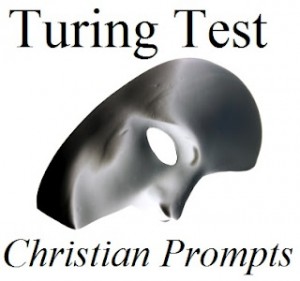This is the fourth entry in the Christian round of the 2012 Ideological Turing Test for Religion. In this round, the honest answers of Christians are mixed in with atheists’ best efforts to talk like Christians. It’s your job to see if you can spot the difference. The voting link appears at the end of the entry, and you can look at all entries in this round here.
When (if ever) have you deferred to your philosophical or theological system over your intuitions?
I try to defer to Jesus’ teachings over my own intuition consistently throughout my life. My intuition is imperfect, and often selfish, petty and small-minded. I fail to do so, very regularly, but yes; not only do I over-rule my intuition regularly, I am supposed to, at least based on my understanding of the teaching of the Church. I am interested in trying to re-train my intuitions to better fit with the way that I wish to behave, but it is not a project that I ever expect to be functionally complete.
Are there people whose opinions on morality you trust more than your own? How do you recognize them? How is trusting them different than trusting someone’s opinion on physics?
Yes, though who to trust and how far are large and complicated questions. I place a lot of trust personally in Marcus Borg, as I have been reading his writings for some time, and he hasn’t led me wrong yet. On a less formal level I also have a lot of love for Fred Clark of the Slacktivist; among other things, he calls out the failures of his own tribe, and shows the love that Christ calls us all to show.
Among other things, if we genuinely wish seekers to come to Christ, we must demonstrate Christ’s love in the world. Through Fred I learnt of Reinhold Niebuhr, and I am now doing further reading on subsidiarity as a means for guiding our actions. I recognise sound moral thinkers by how they help us flawed mortals to emulate Christ’s example; they don’t always have to be explicitly Christian thinkers, but love-of-others does have to shine out of their writings.
This is different to trusting someone’s opinion on physics as part of my trust in someone’s opinions on morality is based on their own actions as an individual, whereas with a physicist I can divorce my opinion of the person from my opinion of their work to a much greater extent.
Can you name any works of art (interpreted pretty broadly: books, music, plays, poetry, mathematical proofs, etc) which really capture the way you see life/fill you with a sense of awe and wonder? You can give a short explanation or just list a few pieces.
For awe and wonder, Handel’s Messiah is very hard to beat. Listening to it straight through takes me across a whole range of emotions, and by the end I feel drained, and yet elated. I think transcendent feelings like awe put us in touch with some small corner of the divine, and the Messiah is an amazing example of that in action.
I also have a deep and abiding love of the church of San Giorgio Maggiore in Venice; its clean elegance and architectural beauty are unmatched in my experience, and albeit it is a Catholic Church, unlike most other Catholic churches I have visited I don’t feel overwhelmed by decoration and distracted from thoughts of the divine.
The other sight I find especially awe-inspiring is the sky at night. I have a yearning to see the aurora borealis in person, and lying on my back looking up at the stars makes me feel how small our human concerns really are; in Orion and Cassiopeia, the Great Bear and wandering Venus, I see that, and I feel intimidated by the sheer scale of it. Only the knowledge that our God who loves us is greater yet than the far-scattered stars reconciles me to the vastness and apparent emptiness of existence.
Click here to judge this entry, and, once you’ve voted, feel free to speculate and trade theories in the comments or look at other entries in this round.
















